|
|
|
Sort Order |
|
|
|
Items / Page
|
|
|
|
|
|
|
| Srl | Item |
| 1 |
ID:
144988
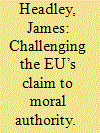

|
|
|
|
|
| Summary/Abstract |
Normative Power Europe is not just an academic concept: it is part of the self-understanding of many EU policymakers. They believe that the EU is setting standards of state behaviour in Europe and globally. The EU is regarded as an elaborator and epitomizer of European and ‘civilised’ values, as a model for other regions and states and as inherently an ethical actor. Russian policymakers reject these notions and, in doing so, increasingly accuse the EU of ‘double standards’, arguing that EU external action is inconsistent and does not always match its rhetoric; that the rhetoric therefore masks the pursuit of interests in its foreign policy; that the EU is like any other state (or state-like entity) and has no special claim to act ethically or to be a moral authority; and that internally, the EU does not live up to the values it seeks to impose on others. This article gives examples of Russian talk of EU double standards, analyses the motivations and assesses the likely impact. It argues that for such criticism to have any impact on EU policy, the critic must be seen as a moral equal, which the EU’s sense of moral superiority over Russia rules out.
|
|
|
|
|
|
|
|
|
|
|
|
|
|
|
|
| 2 |
ID:
132971
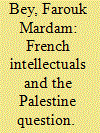

|
|
|
|
|
| Publication |
2014.
|
| Summary/Abstract |
This article focuses on intellectuals-writers, philosophers, academics, scientists, and artists-who, by virtue of their accomplishments and talents, or simply because of their renown, wielded such moral authority that they became at times veritable "leaders of conscience," influencing public opinion and, indeed, government policy in France. Responding to major events, whether colonial wars, international crises, or significant domestic political battles, French intellectuals weighed in time and again, from the Dreyfus affair to the bogus Sarkozy debate on "national identity."1 This article reviews the stance of French intellectuals on the question of Palestine and the wider Arab-Israeli conflict, and examines how the ideological and political assumptions underlying their positions were not always amenable to rational explanation or easily ascribed to traditional attitudes of the Left and Right.
|
|
|
|
|
|
|
|
|
|
|
|
|
|
|
|
| 3 |
ID:
144374
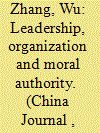

|
|
|
|
|
| Summary/Abstract |
Despite a growing literature on peasant protest in contemporary China, we know little about why some protests are more sustained, disruptive and violent—in a word, militant—than others and thus pose a more serious challenge to the political order. The influential concept of “rightful resistance” cannot explain protest militancy, because it only applies to civil protest. This article studies a case of unusually militant peasant protest in Qizong, Hunan. The protest became militant because the peasants rallied around well-educated and fearless leaders and established a layered and encompassing protest organization. Empowered by central policies on lowering taxes and fees on the peasants (the so-called “peasant burden”) and the Confucian norm of subsistence, the peasants successfully mobilized for drastic reduction of the burden. Local government could not contain the protest, having lost its moral authority and lacking the resources either to suppress it or to make sufficient concessions.
|
|
|
|
|
|
|
|
|
|
|
|
|
|
|
|
| 4 |
ID:
096542


|
|
|
|
|
| Publication |
2010.
|
| Summary/Abstract |
This article argues that Man is a moral being and strategy inherently is a human project. It follows that strategy has to have a moral dimension. All human beings have a moral compass, acquired by social-cultural necessity. The compass has survival value. The problem is that the human race does not possess only one such compass. Since will is key to strategic performance, and because that will requires as fuel a sufficient confidence in the justice of a cause, in principle at least one belligerent's moral armament may be usefully superior to another's. One can claim with confidence that strategic advantage can be secured by some moral advantage.
|
|
|
|
|
|
|
|
|
|
|
|
|
|
|
|
| 5 |
ID:
160123
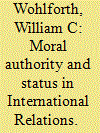

|
|
|
|
|
| Summary/Abstract |
We develop scholarship on status in international politics by focusing on the social dimension of small and middle power status politics. This vantage opens a new window on the widely-discussed strategies social actors may use to maintain and enhance their status, showing how social creativity, mobility, and competition can all be system-supporting under some conditions. We extract lessons for other thorny issues in status research, notably questions concerning when, if ever, status is a good in itself; whether it must be a positional good; and how states measure it.
|
|
|
|
|
|
|
|
|
|
|
|
|
|
|
|
| 6 |
ID:
088556
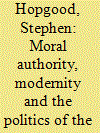

|
|
|
|
|
| Publication |
2009.
|
| Summary/Abstract |
Capitalist modernity's paradox is to erode explicitly the social capital it relies on implicitly to mobilize people to act in concert when they share neither an identity nor an interest. Monetization and rules are the exemplary mechanisms for realizing modernity's aim of commensurability between all social qualities. Simmel helps us see this. But these abstractions create an authority vacuum. The experience of Amnesty International, emblem of modernity, is an example of efforts to overcome this. A close analysis of Amnesty shows that its authority is derived not from Kantian universalism but from a representation of the sacred that serves as a non-modern foundation for modernity. Even as attempts are made to profane this moral authority through commodification and politicization, we can see in the universalization of the Holocaust narrative a renewed effort at creating a singular global memory for humanity as a whole.
|
|
|
|
|
|
|
|
|
|
|
|
|
|
|
|
| 7 |
ID:
090265
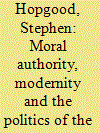

|
|
|
|
|
| Publication |
2009.
|
| Summary/Abstract |
Capitalist modernity's paradox is to erode explicitly the social capital it relies on implicitly to mobilize people to act in concert when they share neither an identity nor an interest. Monetization and rules are the exemplary mechanisms for realizing modernity's aim of commensurability between all social qualities. Simmel helps us see this. But these abstractions create an authority vacuum. The experience of Amnesty International, emblem of modernity, is an example of efforts to overcome this. A close analysis of Amnesty shows that its authority is derived not from Kantian universalism but from a representation of the sacred that serves as a non-modern foundation for modernity. Even as attempts are made to profane this moral authority through commodification and politicization, we can see in the universalization of the Holocaust narrative a renewed effort at creating a singular global memory for humanity as a whole.
|
|
|
|
|
|
|
|
|
|
|
|
|
|
|
|
| 8 |
ID:
134138
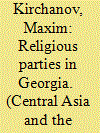

|
|
|
|
|
| Publication |
2014.
|
| Summary/Abstract |
The Georgian Apostolic Autocephalous Orthodox Church plays a significant role in the political and intellectual life of Georgian society. Religious parties are active in Georgia's political landscape. The ideologues and theorists of clerical parties are developing ideas and concepts of Georgian political nationalism and supporting the Georgian language and identity. The ideology of the clerical parties in Georgia is of a mixed nature. The religious parties are developing ideas of political traditionalism. Georgian conservative theorists also support liberal theories in the economic sphere. Political instability is promoting an increase in the moral and political authority of the Church in Georgia. The prospects for the development and transformation of clerical parties are vague and still uncertain.
|
|
|
|
|
|
|
|
|
|
|
|
|
|
|
|
| 9 |
ID:
131902
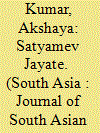

|
|
|
|
|
| Publication |
2014.
|
| Summary/Abstract |
Avatar
Film Star
Political Surplus
Truth
Entertainment
News
Crime
Cultural Economy
Moral Authority
Political Authority
Aamir Khan
Narrative Ingenuity
Politics
Social Changes
Trope
Social System
Social Reforms
|
|
|
|
|
|
|
|
|
|
|
|
|
|
|
|
|
|
|
|
|